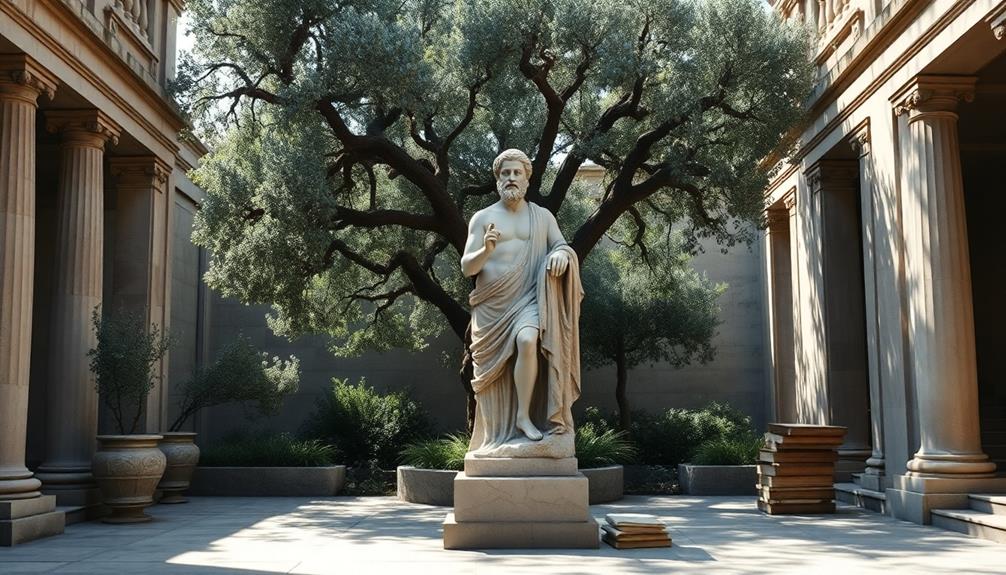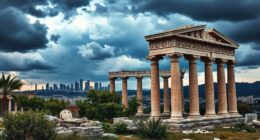Greek skepticism teaches you the value of questioning accepted beliefs and emphasizes the limits of human knowledge. By practicing the suspension of judgment, you can find tranquility in uncertainty. This philosophical approach, rooted in thinkers like Pyrrho and Sextus Empiricus, challenges the reliability of sensory perceptions, pushing you to explore what you truly know. Ancient skeptics laid the groundwork for critical inquiry, influencing modern thought in ethics, science, and education. Embracing this philosophy can reshape how you perceive knowledge today, leading you to uncover even more about the nature of doubt and understanding.
Key Takeaways
- Ancient skepticism promotes critical examination of beliefs, emphasizing inquiry over blind acceptance and recognizing the limitations of human knowledge.
- Pyrrho of Elis and Sextus Empiricus are key figures, advocating for suspension of judgment to achieve mental tranquility (ataraxia).
- Pyrrhonism and Academic skepticism differ; the former focuses on radical doubt, while the latter allows for examination of opposing views.
- Skepticism influenced various fields today, including science, ethics, religion, and education, promoting dialogue and critical analysis.
- The legacy of Greek skepticism continues to encourage exploration of subjective vs. objective truths in modern philosophical discourse.
Definition of Ancient Skepticism
Ancient skepticism often challenges you to question accepted beliefs and values the process of inquiry above blind acceptance. Rooted in the Greek term "skepsis," this philosophical movement encourages you to critically examine knowledge claims rather than accepting them without evidence.
Greek philosophers like Pyrrho, Timon, and Sextus Empiricus emphasized the importance of the suspension of judgment, known as epochē, which means withholding firm beliefs in the face of conflicting impressions.
By recognizing the limitations of human knowledge, ancient skeptics argue that you should avoid making absolute claims. This approach fosters an environment where uncertainty is acknowledged, allowing for a more profound understanding of your beliefs and experiences.
Unlike dogmatists, who cling to rigid convictions, ancient skeptics promote a lifestyle that cultivates tranquility and peace of mind (ataraxia). This state arises from refraining from dogmatic beliefs and embracing the fluidity of perception.
The legacy of ancient skepticism continues to resonate in contemporary discussions about the nature of knowledge and belief, reminding you that true wisdom often lies in questioning rather than asserting.
Key Figures in Skepticism

When you explore the key figures in skepticism, you'll encounter Pyrrho of Elis, whose tranquil philosophy laid the groundwork for questioning beliefs.
His approach to doubt can be likened to the emotional instability seen in individuals with BPD, as both encourage a critical examination of one's thoughts and feelings.
You'll also see how Sextus Empiricus's writings shaped the understanding of living in accordance with appearances. This notion of traversing emotional landscapes parallels the challenges faced by those with BPD traits in their interpersonal relationships.
Pyrrho's Tranquil Philosophy
Embracing a philosophy of tranquility, Pyrrho of Elis stands as a pivotal figure in the development of skepticism. Living around 310-270 B.C., Pyrrho founded what we now call Pyrrhonian skepticism. His teachings emphasize the suspension of judgment on beliefs and claims to knowledge in general. By doing so, he sought to achieve ataraxia, or mental peace, which arises from recognizing the limitations of human understanding.
This concept is akin to the importance of having a well-structured budget in personal finance, as it fosters a sense of control and stability.
During his travels with Alexander the Great, Pyrrho encountered diverse cultures and philosophies, which shaped his outlook. He learned to question the reliability of sensory perceptions and the validity of competing beliefs.
Anecdotes about Pyrrho illustrate his remarkable indifference to external circumstances; for instance, he remained calm during storms, embodying his commitment to tranquility amid uncertainty.
Sextus Empiricus's Influence
Sextus Empiricus plays an essential role in shaping our understanding of skepticism, building on the foundations laid by Pyrrho. Living in the second half of the second century A.D., he's best known for his works like *Outlines of Pyrrhonism*, where he documents and expands upon Pyrrhonian arguments. His emphasis on suspending judgment is vital; he believed that by doing so, you can achieve mental tranquility, or ataraxia.
In a world increasingly influenced by advanced AI technologies, Sextus's critique of dogmatism resonates more than ever, as we grapple with the implications of machine learning and data-driven decisions.
Sextus critiques dogmatism, arguing that relying on sensory experiences leads to conflicting beliefs, which highlights the limitations of human perception in evaluating knowledge. He challenges the notion of certainty, suggesting that absolute truth remains elusive. Instead, he encourages you to live according to appearances while recognizing the distinctions between practical living based on plausible impressions and the quest for ultimate knowledge.
His writings greatly influenced later philosophical discourse, especially in epistemology, shaping how we approach certainty and belief today. Through Sextus Empiricus, the principles of skepticism continue to resonate, inviting you to question the reliability of your knowledge and embrace a more nuanced understanding of truth.
Academic Skepticism's Development
How did Academic Skepticism evolve within Plato's Academy? It all began with Arcesilaus, who argued that certainty in knowledge is unattainable. He encouraged academic skeptics to suspend judgment on all propositions, challenging the very foundations of what was considered knowable.
His critique of Stoicism, particularly against Zeno of Citium's idea that knowledge could be gained through kataleptic impressions, raised questions about the reliability of sensory information. This questioning mirrors the way we often grapple with our own perceptions and beliefs, much like the feelings of insecurity reflected in dreams of falling.
Following Arcesilaus, Carneades took the helm of the Academy and introduced a practical criterion known as "to pithanon." This concept emphasized relying on convincing impressions to guide ethical actions and living, marking a shift toward a more pragmatic approach.
Carneades expanded on the skeptical arguments of his predecessors, methodically questioning the reliability of sense impressions and Stoic claims regarding knowledge and ethical values.
The distinction between Academic and Pyrrhonian skepticism remains a topic of debate. While both schools challenge the certainty of knowledge, they differ in their implications for judgment and truth.
Understanding these developments helps clarify the evolution of skepticism and its lasting impact on philosophical thought today.
Central Concepts of Skeptical Inquiry

One key aspect of skeptical inquiry is the suspension of judgment, known as epoch, which skeptics argue is a rational response to the conflicting beliefs and impressions we encounter.
By practicing this suspension, you learn to critically assess your sensory information rather than accepting it at face value. Skeptics emphasize the importance of distinguishing between appearances and reality, urging you to investigate your beliefs and the sources behind them. This critical approach mirrors the principles of ethical considerations in educational data mining, where questioning data reliability and biases is essential.
Central to this inquiry is the criterion of truth, which raises questions about the reliability of your sense perceptions. Are those impressions genuinely reflective of reality, or are they merely illusions?
By challenging dogmatism, you set out on a quest for truth that involves evaluating conflicting arguments and experiences. This ongoing process not only fosters a calm spirit but also cultivates inner peace, known as ataraxia.
Historical Context and Influence

To grasp the roots of skeptical thought, you need to contemplate its emergence during the Hellenistic period as a reaction to earlier dogmatic philosophies.
This era was characterized by a burgeoning interest in the transformative power of curiosity, as thinkers began to question established norms and seek new knowledge.
Figures like Pyrrho and Sextus Empiricus shaped skepticism's core principles, which continue to influence modern philosophical discussions.
Origins of Skeptical Thought
Skeptical thought emerged in ancient Greece as philosophers began questioning the reliability of knowledge and perceptions. Early thinkers like Heraclitus set the groundwork for skepticism by challenging conventional beliefs. It wasn't long before Socratic thinkers joined the fray, encouraging critical examination and dialogue.
This laid the foundation for Academic Skepticism at Plato's Academy, where figures like Arcesilaus and Carneades questioned the possibility of certain knowledge, arguing that we should doubt our claims to truth. The exploration of skepticism parallels modern inquiries into areas such as astrology's scientific validity, where the reliability of perceived traits is scrutinized.
Pyrrho of Elis further advanced skeptical thought by introducing Pyrrhonism, advocating for the suspension of judgment. He believed that withholding belief could lead to tranquility, promoting a practical approach to living. Pyrrhonism emphasized that rather than seeking absolute truths, individuals should focus on what brings them peace.
Key texts by skeptics like Sextus Empiricus documented these ideas, bridging ancient Greek thought with later philosophical discussions about knowledge and belief. The interplay between skepticism and other philosophies, such as Stoicism and Epicureanism, enriched the discourse, highlighting the importance of critically examining beliefs.
This historical context sets the stage for a deeper understanding of skepticism's relevance today.
Key Philosophical Figures
Exploring the landscape of ancient Greek skepticism reveals a cast of influential philosophers who shaped its development and legacy. Pyrrho of Elis, the founder of Pyrrhonism, emphasized the importance of suspending judgment to achieve tranquility. He argued that by withholding belief in absolute certainty, one could navigate life more peacefully.
This philosophical approach mirrors the contemporary understanding of the importance of clean air for maintaining a healthy environment, as seen in the air purification technologies that enhance well-being. His ideas laid the groundwork for later thinkers like Sextus Empiricus, who documented Pyrrhonian arguments and advocated living according to appearances without firm conclusions.
Arcesilaus transformed the Academic school, bringing skepticism to the forefront of philosophical discourse. He challenged the possibility of certain knowledge, promoting the suspension of judgment regarding all propositions.
This shift not only influenced his contemporaries but also set the stage for further debates on skepticism. Carneades expanded on these ideas, introducing the criterion of "to pithanon," which assessed the practicality of convincing impressions.
His critiques of Stoicism, alongside Arcesilaus's, highlighted the ongoing tension between skepticism and dogmatism in ancient thought. Together, these philosophers forged a path that would profoundly shape the trajectory of skepticism, inviting deeper contemplation on the nature of knowledge and belief.
Impact on Modern Philosophy
Ancient skepticism carved a path for modern philosophy, reshaping how we approach knowledge and belief. The contributions of ancient skeptics like Pyrrho and Sextus Empiricus continue to influence contemporary thought, particularly in how we view certainty and knowledge.
This critical inquiry aligns with techniques in personal development, such as goal setting, where questioning our beliefs can lead to profound self-discovery. Here are four key impacts:
- Questioning Knowledge Claims: Ancient skepticism encourages you to question what you think you know, fostering a critical mindset.
- Influence on Renaissance Thought: Skeptical ideas challenged dogmas, paving the way for the scientific method and empirical inquiry.
- Philosophical Challenges: Thinkers like Descartes and Kant grappled with skepticism, addressing the reliability of sensory experiences and the quest to know with certainty.
- Contemporary Epistemology: The legacy of skepticism inspires ongoing debates in the history of Western philosophy, particularly around relativism and moral subjectivity.
These principles of doubt and inquiry promote intellectual humility and critical thinking, essential tools for maneuvering today's complex issues.
Pyrrhonism vs. Academic Skepticism

When delving into the domain of Greek skepticism, two prominent schools of thought emerge: Pyrrhonism and Academic skepticism. Pyrrhonism, founded by Pyrrho of Elis, emphasizes achieving tranquility by suspending judgment (epoché) on all beliefs and living according to appearances.
In contrast, Academic skepticism, developed in Plato's Academy, argues that certainty in knowledge is unattainable. Thinkers like Arcesilaus and Carneades critiqued Stoic claims, asserting that no criteria exist to distinguish true from false knowledge, thereby promoting a neutral cognitive state. This exploration of uncertainty resonates with the emotional dysregulation seen in conditions like Borderline Personality Disorder, where individuals may struggle to find stability in their beliefs and emotions, reflecting the challenges of traversing complex human experiences understanding emotional instability.
While Pyrrhonism adopts a radical skepticism that questions all beliefs, Academic skepticism takes a dialectical approach. This means it allows for the examination of opposing views and the acceptance of probable knowledge as a guide for action, particularly in ethical matters.
The key distinction lies in Pyrrhonism's commitment to withholding judgment on all claims versus Academic skepticism's practical application of skepticism, which can lead to more actionable conclusions in philosophical debates. Historical interpretations of both forms of skepticism have evolved, fueling ongoing discussions among philosophers about their differences and relevance today.
Criterion of Truth in Skepticism

In the quest for understanding truth, skeptics have long grappled with the challenge of establishing reliable criteria. Here are four key considerations that illustrate their struggle:
- To Pithanon: Carneades introduced this criterion, emphasizing convincing impressions as a practical standard for determining truth.
- Sensory Reliability: Epicureans believed all sensory experiences are true, while Stoics debated true impressions versus illusions, leading to conflicting views.
- Epoché: This crucial concept advocates suspending judgment on knowledge claims without sufficient justification, promoting a cautious approach.
- Conflicting Perceptions: Sextus Empiricus highlighted the challenges posed by varying sensory experiences, complicating the establishment of a universal criterion of truth.
Skepticism, consequently, doesn't just question existing knowledge; it critically assesses the epistemological standards of its time.
Ancient skeptics argued that no definitive criteria exist to separate true beliefs from false ones. This ongoing uncertainty encourages a thoughtful examination of your own knowledge claims and the sensory experiences that inform them.
Relativism and Metaphysical Implications

Relativism frequently challenges our understanding of truth, particularly through the lens of Greek skepticism. Thinkers like Protagoras claimed that truth is subjective, asserting that "man is the measure of all things." This idea raises vital questions about knowledge and how we perceive reality.
When you consider Plato's dialogues, you'll notice he scrutinizes the stability of properties, arguing that sensory experiences can't reliably lead to knowledge of truth. Sextus Empiricus further emphasizes skepticism by distinguishing between appearances and reality, suggesting that our perceptions often mislead us. This perspective complicates the notion of absolute truths.
In contrast, Aristotle critiques Protagorean relativism, advocating for clear definitions and objective standards to ground philosophical inquiry. The metaphysical implications of this debate are profound. They force you to grapple with whether absolute truths exist or if everything is subjective.
As constant flux characterizes our world, asserting knowledge claims becomes increasingly complex. In a landscape shaped by relativism, understanding the nature of knowledge and truth demands a careful navigation between subjective perceptions and the quest for a more stable epistemological foundation.
Modern Engagement With Skepticism

Many modern thinkers actively engage with skepticism to address pressing contemporary issues, drawing from the rich traditions established by ancient philosophers.
This engagement helps you critically evaluate knowledge claims across various fields. Here are some key areas where skepticism plays a crucial role today:
- Science: Questioning the validity of scientific claims and methodologies.
- Ethics: Challenging moral absolutes and exploring relativistic views.
- Religion: Examining faith claims through inquiry and critical analysis.
- Education: Promoting dialogue and the Socratic method over dogmatic assertions.
Legacy of Greek Skepticism

Greek skepticism profoundly shaped the way you think about knowledge and truth today, encouraging a culture of inquiry that challenges assumptions. The legacy of this philosophical tradition is evident in how you engage with your beliefs and the pursuit of knowledge. Key figures like Pyrrho of Elis and Sextus Empiricus laid the groundwork for critical thinking by promoting the suspension of judgment, which helps you navigate uncertainty and dogmatism.
| Aspect | Description |
|---|---|
| Origin | Rooted in ancient Greece, emphasizing questioning. |
| Key Figures | Pyrrho of Elis and Sextus Empiricus laid foundational ideas. |
| Types of Skepticism | Academic (from Plato) and Pyrrhonian (practical focus). |
| Influence on Philosophy | Shaped debates on knowledge, truth, and belief today. |
| Ongoing Relevance | Encourages intellectual humility and relativism. |
Your understanding of Greek skepticism fosters a mindset where you continually question and reassess your knowledge. This encourages deeper engagement with philosophical discourse, helping you appreciate the complexities of truth and belief in a world filled with uncertainty.
Frequently Asked Questions
What Is the Greek Philosophy of Doubt?
The Greek philosophy of doubt encourages you to question beliefs and suspend judgment. It promotes inquiry over certainty, suggesting that understanding comes from examining conflicting perceptions rather than accepting knowledge without critical thought or evidence.
What Is Greek Skepticism in Philosophy?
Greek skepticism in philosophy encourages you to question your beliefs and suspend judgment. It highlights the limitations of knowledge, inspiring a critical approach to understanding and promoting tranquility through inquiry rather than accepting dogmatic assertions.
What Is the Philosophical Problem of Skepticism?
When you ponder the philosophical dilemma of skepticism, you're diving into a world of uncertainty. It invites you to question the nature of knowledge and challenges your ability to discern truth from illusion, fostering a thoughtful hesitation.
What Is the Difference Between Doubt and Skepticism?
Doubt's your personal feeling of uncertainty about beliefs, while skepticism's a broader approach questioning knowledge claims. You might experience doubt spontaneously, but skepticism requires critical thinking and systematic inquiry to explore and understand deeper truths.
Conclusion
In exploring Greek skepticism, you uncover not just ancient doubt, but a mirror reflecting our own uncertainties. This philosophical tradition urges you to question everything, inviting a deeper understanding of truth and belief. As you navigate today's complexities, remember: skepticism isn't merely doubt; it's a journey toward wisdom. Embracing this path can transform your perspective, encouraging you to dance with uncertainty rather than flee from it. Ultimately, the legacy of skepticism beckons you to engage with life's profound mysteries.









